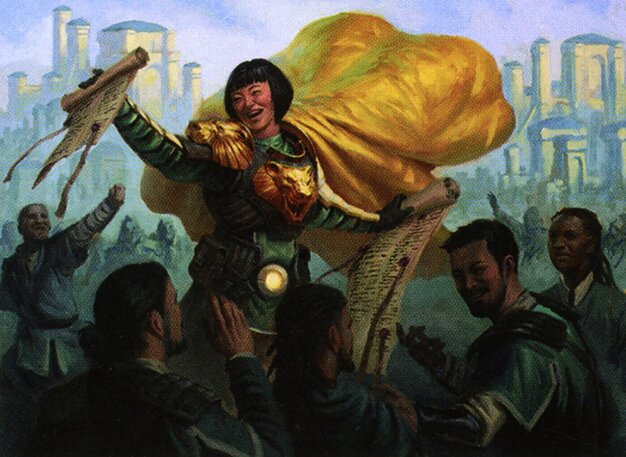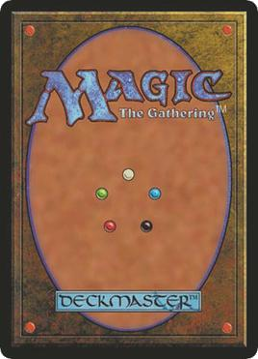 Art by Johan Grenier
Art by Johan GrenierWelcome to the Citizen’s Cube, a cube that is more powerful than peasant, but not as powerful as prince. The goal of this cube was to not spend more than 300 dollars out of my pocket, while having fair but more powerful than most usual budget cube.
Another goal of this cube is, although not to be new player friendly, is to not include unexplained mechanics on cards. The exceptions are treasure tokens, which have a dedicated archetype for them, and the monarch, which adds gas for the second draw matters archetype (the one exception is the Gold token on The First Iroan Games, which is just a treasure token but without synergy). Both of which don’t require much explanation in a Cube briefing, and a token can clear things up. There are also no cards with text on the back, as to make drafting a little cleaner (and unsleeving cards is annoying). All of this means no dungeons, initiative, daybound/nightbound, or battles.
MechanicsThere are many mechanics and keyword abilities, but I try to find redundancy wherever possible, and every non-evergreen mechanic not listed below has reminder text and doesn’t have huge mechanical complexity.
Saga714.2b “{rN}—[Effect]” means “When one or more lore counters are put onto this Saga, if the number of lore counters on it was less than N and became at least N, [effect].”
714.2e A Saga’s final chapter ability is the chapter ability which has its final chapter number in its chapter symbol.
Sagas are an enchantment subtype with some extra rules baggage. They enter the battlefield with a lore counter, and after every subsequent draw step it gains another lore counter. It progresses through the chapters with every lore counter it gets. Whenever it gains a lore counter, the chapter ability next to the corresponding roman numeral triggers. Right after the last chapter ability resolves, sacrifice the saga.
Prototype702.160a Prototype is a static ability that appears on prototype cards that have a secondary set of power, toughness, and mana cost characteristics. A player who casts a spell with prototype can choose to cast that card “protoyped.” If they do, the alternative set of its power, toughness, and mana cost characteristics are used.
Basically, there are two different costs, with its stats and color changing if you prototype it, and the normal cost is usually over costed. However, there is one rules interaction that newer or unfamiliar players may miss.
718.4. In every zone except the stack or the battlefield, and while on the stack or the battlefield when not cast as a prototyped spell, a prototype card has only its normal characteristics.
To those unfamiliar, this is a concept called memory, where when a card moves between zones (for example battlefield to grave, hand or exile), it loses all memories of its former life, a.k.a. anything that changes how the card works (Counters, auras, and more). So, a neat and useful trick is that when using a blink spell (like Flicker of Fate), a prototyped creature will return to the battlefield without the prototype status. Basically, you can blink a prototyped creature to cheat out its more expensive version.
Adventures715.3. As a player casts an adventurer card, the player chooses whether they cast the card normally or as an Adventure.
715.3d Instead of putting a spell that was cast as an Adventure into its owner’s graveyard as it resolves, its controller exiles it. For as long as that card remains exiled, that player may cast it. It can’t be cast as an Adventure this way, although other effects that allow a player to cast it may allow a player to cast it as an Adventure.
715.4. In every zone except the stack, and while on the stack not as an Adventure, an adventurer card has only its normal characteristics.
Cards with an adventure can either be cast normally or as an adventure. The adventure is an instant or sorcery, and after it resolves, you exile it. Then you can then cast the normal version for as long as it remains exiled. If you cast the normal side, and it would go to the graveyard, it can’t be cast later in this way. Also, when in any zone other than the stack cast as an adventure, it’s not an adventure, so Dreadhorde Arcanist can’t target Shepherd of the Flock.
General Archetypes — Control/Blink
— Control/Blink
 — Control/Second draw matters
— Control/Second draw matters
 — Treasures
— Treasures
 — Gruul Stompy/Aggro
— Gruul Stompy/Aggro
 — +1/+1 Counters
— +1/+1 Counters
 — Death and Taxes/Control
— Death and Taxes/Control
 — Prowess/Noncreature matters
— Prowess/Noncreature matters
 — The Rock/ Midrange
— The Rock/ Midrange
 — Equipment
— Equipment
 — Ramp/Control
Sub Archetypes
— Ramp/Control
Sub Archetypes
 Reanimater (splashes well with
Reanimater (splashes well with  ,
, , and
, and  )
)

